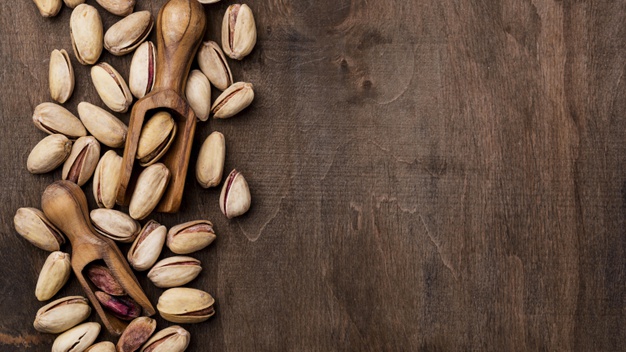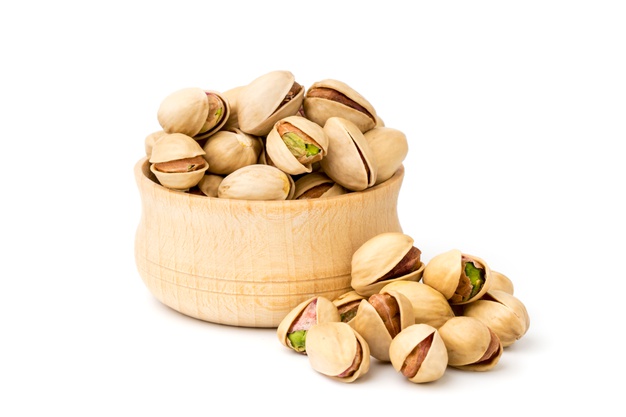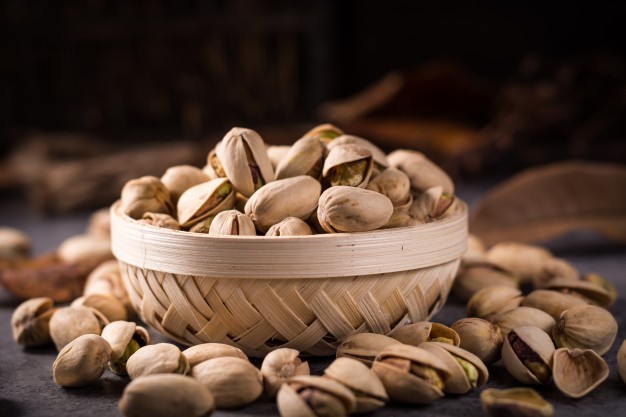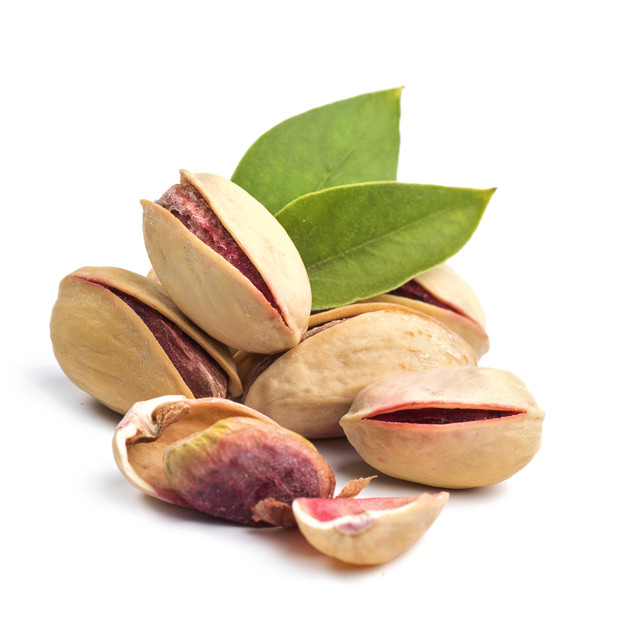Pistachio is a nutrient dense nut that offers numerous health benefits.
Nutritional composition
- It contains desirable amount of carbohydrate and fibre
- It also contains significant amount of protein
- It has a healthy ratio of fatty acids. It contains both mono and poly unsaturated fatty acids (especially omega-3-fatty acid and alpha linoleic acid) and also contains saturated fatty acid but it is totally free from cholesterol
- It is packed with numerous micronutrients, which include Vitamin A, Vitamin C, Vitamin E, Vitamin B1, B2, B3, B5, B6, calcium, phosphorus, potassium, iron, copper, zinc, selenium, magnesium and manganese
Health benefits
Role on immunity
- Its antioxidant, micronutrients and polyphenolic compounds are accountable for boosting up the overall immunity of body
- It contains adequate amount of Vitamin B6, which helps to promote the functioning of immune system
- Consumption of pistachio is awfully helpful for preventing normal cold and flu
- It also helps to decrease the risk of developing infectious diseases as it is responsible for fighting off invading microbes
Antioxidant activity
- Vitamin C, Vitamin E, carotenoids, γ-tocopherol, phytosterols and polyphenolic compounds of pistachio help to exert antioxidant activities
- It helps to decrease the concentration of free radicals within body and reduces its harmful consequences
- It is also associated with decreasing oxidative stress hence prevents further damages of body. Thus its consumption is very much useful for decreasing the risk of developing chronic diseases
- It helps to protect every cells of body from oxidative damages and helps to sustain their health and functionality that play significant role in preventing premature ageing


Role on gut health
- Nuts are generally rich in fibre and pistachio is not an exception. Fibre plays significant role in improving bowel movements hence helps in smooth defecation
- It also acts as an imperative prebiotic, which is associated with enhancing the growth of intestinal beneficial microbes, hence promotes gut health
- It has seen that fibre content of pistachio is fermented by the intestinal beneficial microbes, which eventually produces fatty acid, especially short chain fatty acid. These fatty acids are coupled with exhibiting numerous health benefits and especially help in decreasing the prevalence of colon cancer
- It also helps to improve digestion as well as absorption of nutrients
Role on eye health
- Carotenoid, Vitamin E, lutein and zeaxanthin found in pistachio are considered as the principal compounds responsible for promoting eye health
- Lutein and zeaxanthin of pistachio are closely related with protecting the retina from injuries and also help to promote the health of retina that ultimately improves vision
- Its antioxidant activity is also responsible for protecting the eye from oxidative damages and plays significant role in reducing the susceptibility of developing eye disorders
- It is considered as a good source of zinc (mineral), which plays vital role in enhancing the absorption of carotenoids within body and it also promotes night vision
- Individual who consume pistachio have lesser risk of developing cataract and macular degeneration

Role on nervous system
- Consumption of pistachio is very much helpful for supporting the growth and development of central as well as peripheral nervous system
- It is a good source of Vitamin B6, which is essentially required by the body for the optimum development of brain and it also helps to promote brain functionality
- It helps to protect every nerve cell from oxidative damages
- Vitamin B6 of pistachio also plays significant role in regulating the secretion of serotonin as well as norepinephrine, which are responsible for controlling mood and stress
- It is associated with producing the gamma wave response, which helps to promote cognitive functions, memory, ability of learning and perception
Role on reproductive health
- It has aphrodisiac property and helps to increase sexual desire
- It is also associated with boosting the fertility
- Phytosterol, arginine and antioxidant components of pistachio play vital role in treating erectile dysfunction
- It contains significant amount of phytoestrogen, which has similar action with estrogen hormone thus its consumption is extremely helpful for maintaining normal menstrual cycle. It also helps to improve the secondary sex characteristics

Role on skin
- It contains various important substances that play crucial role in promoting skin health
- Its unsaturated fatty acid and essential oil components are responsible for moisturizing the skin
- Its antioxidant components are accountable for protecting the skin from oxidative damages thus reduces the prevalence of skin disorders and it also helps to prevent ageing
- Its Vitamin E content plays significant role for providing supple skin
- It also helps to protect the skin from the harmful effects of UV ray
Role on blood vessel
- Consumption of pistachio is very effective for maintaining the function of endothelium (inner lining of blood vessels)
- Endothelial dysfunction is considered as one of the most important causative factors for cardio vascular disease
- Pistachio contains significant amount of L-arginine, which is subsequently converted into nitric oxide within body. Nitric oxide helps to relax the smooth cells present in endothelium and dilate the blood vessels, which is responsible for enhancing blood flow
- It is better to consume pistachio as it helps to prevent vascular stiffness by stimulating endothelial functions, which helps to reduce the susceptibility of cardiac disorders

Anti-inflammatory activities
- Polyphenols, dietary fibres, monounsaturated fatty acids, polyunsaturated fatty acids and essential oil components of pistachio are considered as the most important bio active compounds, responsible for exerting anti-inflammatory property
- It has seen that these bioactive compounds significantly reduces the concentration of inflammatory mediators within body that helps to inhibit inflammatory events hence reduces the risk of developing chronic inflammatory diseases
- Anti-inflammatory property of pistachio makes it an imperative therapeutic substance for reducing pain
- It also helps to prevent swelling hence its consumption is very much helpful for improving the symptoms of arthritis (joint swelling)

Therapeutic advantages
- It is extensively used as an imperative therapeutic agent for treating hyperglycemia. Its fibre content helps to reduce blood sugar concentration by decreasing glucose absorption from intestine. On the other hand its zinc content is responsible for stimulating insulin production (as zinc is an important structural component of insulin), which is closely related with regulating blood sugar level
- Its fibre content and unsaturated fatty acid contents are responsible for decreasing elevated lipid profile. Its consumption is enormously useful for reducing the concentration of LDL, VLDL and triglyceride within body. It also helps to increase the level of good cholesterol (HDL), which ultimately helps to reduce the risk of developing atherosclerosis and coronary artery disease
- It also facilitates weight reduction
- It helps to enhance the hemoglobin level as well

General consideration of using Pistachio
- It can be used to prepare nut butter
- It can also be utilized for preparing pesto
- It can be consumed with salads
- It can also be utilized as pizza topping
- It can be sprinkled on baked fish before consumption
Risk factors
- Over consumption of pistachio is not good for health as it is a fibre rich food stuff hence its excess consumption may cause several gastrointestinal abnormalities like diarrhoea, nausea, vomiting, indigestion, flatulence, constipation and abdominal discomfort
- Whereas excess consumption of roasted pistachio is responsible for increasing blood pressure

Source:
Bulló, M., Juanola-Falgarona, M., Hernández-Alonso, P. and Salas-Salvadó, J., 2015. Nutrition attributes and health effects of pistachio nuts. British Journal of Nutrition, 113(S2), pp.S79-S93.
Dreher, M.L., 2012. Pistachio nuts: composition and potential health benefits. Nutrition reviews, 70(4), pp.234-240.
GHASEMINASAB, P.M., Ahmadi, A. and MAZLOOMI, S.M., 2015. A review on pistachio: Its composition and benefits regarding the prevention or treatment of diseases.
Kashaninejad, M. and Tabil, L.G., 2011. Pistachio (Pistacia vera L.). In Postharvest biology and technology of tropical and subtropical fruits (pp. 218-247e). Woodhead Publishing.
Nadimi, A.E., Ahmadi, Z., Falahati-Pour, S.K., Mohamadi, M., Nazari, A., Hassanshahi, G. and Ekramzadeh, M., 2019. Physicochemical Properties and Health Benefits of Pistachio Nuts. International Journal for Vitamin and Nutrition Research.
Rajput, R., Kaur, A. and Nayik, G.A., 2020. Pistachio. In Antioxidants in Vegetables and Nuts-Properties and Health Benefits (pp. 489-507). Springer, Singapore.
Terzo, S., Baldassano, S., Caldara, G.F., Ferrantelli, V., Lo Dico, G., Mulè, F. and Amato, A., 2019. Health benefits of pistachios consumption. Natural product research, 33(5), pp.715-726.


